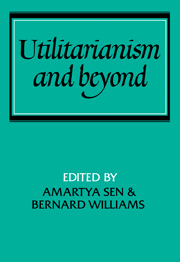Book contents
- Frontmatter
- Contents
- Preface
- Introduction: Utilitarianism and beyond
- 1 Ethical theory and utilitarianism
- 2 Morality and the theory of rational behaviour
- 3 The economic uses of utilitarianism
- 4 Utilitarianism, uncertainty and information
- 5 Contractualism and utilitarianism
- 6 The diversity of goods
- 7 Morality and convention
- 8 Social unity and primary goods
- 9 On some difficulties of the utilitarian economist
- 10 Utilitarianism, information and rights
- 11 Sour grapes – utilitarianism and the genesis of wants
- 12 Liberty and welfare
- 13 Under which descriptions?
- 14 What's the use of going to school?
- Bibliography
14 - What's the use of going to school?
Published online by Cambridge University Press: 30 January 2010
- Frontmatter
- Contents
- Preface
- Introduction: Utilitarianism and beyond
- 1 Ethical theory and utilitarianism
- 2 Morality and the theory of rational behaviour
- 3 The economic uses of utilitarianism
- 4 Utilitarianism, uncertainty and information
- 5 Contractualism and utilitarianism
- 6 The diversity of goods
- 7 Morality and convention
- 8 Social unity and primary goods
- 9 On some difficulties of the utilitarian economist
- 10 Utilitarianism, information and rights
- 11 Sour grapes – utilitarianism and the genesis of wants
- 12 Liberty and welfare
- 13 Under which descriptions?
- 14 What's the use of going to school?
- Bibliography
Summary
Education seems to present special difficulties for all liberal theories. Utilitarians and those whom I shall call ‘rights theorists’, i.e. those who give priority to the equal right of all to civil and political freedom, agree on one point about the education of children: at least in principle they both are committed to providing an education that is neutral among substantive conceptions of the good life. Yet we probably will never be able to educate children without prejudicing their future choice of particular ways of life. One might argue, therefore, that education creates the same problem for any form of liberalism. That argument is incorrect. Although rights theorists also must take consequences into account, they can provide a more consistently liberal solution to the problem of education for several reasons, which I shall summarise here and elaborate below. Freedom provides a better standard than happiness by which to determine what and how to teach children. In addition, one can derive some essential features of a liberal educational programme from the standard of freedom that cannot be derived from that of happiness. That educational programme will be neutral towards many, though not all, ways of life and concrete enough to guide educators. In addition, unlike utilitarianism, rights theorists can respond cogently to the conservative claim that education must perpetuate particular societal values and prepare children for necessary social functions.
Education for happiness
Utilitarians pay a high price for assuming that happiness must be subjectively defined by each individual, an assumption that frees them of the need to defend an objective conception of the good.
- Type
- Chapter
- Information
- Utilitarianism and Beyond , pp. 261 - 278Publisher: Cambridge University PressPrint publication year: 1982
- 8
- Cited by



